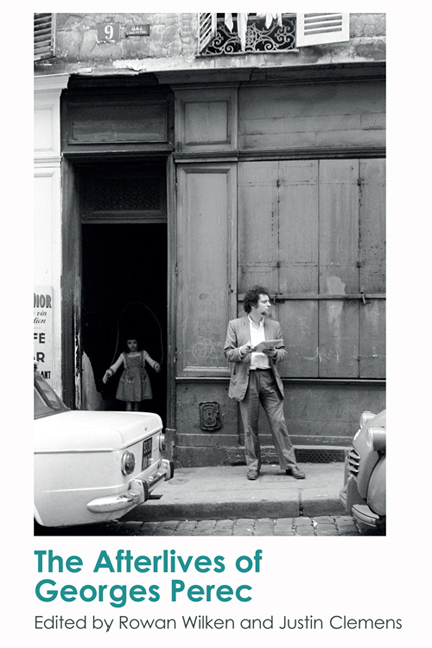Book contents
- Frontmatter
- Contents
- List of Figures
- Acknowledgements
- Notes on Contributors
- 1 Posthumous News: The Afterlives of Georges Perec
- PART I Art of the (Un)realisable
- PART II The Poetics of the Quotidian and Urban Space
- 6 Georges Perec and the Significance of the Insignificant
- 7 What Perec Was Looking For: Notes on Automation, the Everyday and Ethical Writing
- 8 ‘Things That Should Be Short’: Perec, Sei Shōnagon, Twitter and the Uses of Banality
- PART III Ludic Intensities and Creative Constraints
- PART IV Productive Problems of Description and Transcription
- Afterword
- Index
7 - What Perec Was Looking For: Notes on Automation, the Everyday and Ethical Writing
from PART II - The Poetics of the Quotidian and Urban Space
Published online by Cambridge University Press: 07 December 2017
- Frontmatter
- Contents
- List of Figures
- Acknowledgements
- Notes on Contributors
- 1 Posthumous News: The Afterlives of Georges Perec
- PART I Art of the (Un)realisable
- PART II The Poetics of the Quotidian and Urban Space
- 6 Georges Perec and the Significance of the Insignificant
- 7 What Perec Was Looking For: Notes on Automation, the Everyday and Ethical Writing
- 8 ‘Things That Should Be Short’: Perec, Sei Shōnagon, Twitter and the Uses of Banality
- PART III Ludic Intensities and Creative Constraints
- PART IV Productive Problems of Description and Transcription
- Afterword
- Index
Summary
I write: I inhabit my sheet of paper, I invest it, I travel across it. I incite blanks, spaces (jumps in meaning: discontinuities, transitions, changes of key).
Perec's writing continually revisits, through its own material operations, specifically through experiments in writing involving a play with constraint, automation and scale, the question of how to write. This question may be opened up. At issue is not only how to write, but how to write ethically, and moreover how to write ethically about the everyday. All these questions – and the ways that Perec found to address them – have relevance today.
Perec's work is characterised by an investigation of the very small scale, the insignificant detritus and banal repetitions of a life on the one hand, and a preoccupation with various forms of automation and constraint on the other. The relevant genealogies are well known: Perec's work on the everyday intersects with that of Henri Lefebvre and his associates, who were writing in mid-twentieth-century France. His writing certainly shares with that group a sense of the refractory but elusive qualities of everyday life and a sense of its significance. At the heart of what Lefebvre explored in terms of alienation, and the place we may find ourselves, the everyday, everyday life, is where we are lost and found. Then there is Oulipo, the Workshop for Potential Literature, founded in the early 1960s with members including Italo Calvino and Raymond Queneau. This threw down a ‘challenge to chance’, experimenting with writing as form and exploiting constraint and its productivity, often through ‘mechanical’ forms of ‘automatism’ brought to bear to generate material and operate upon it. This was a writing group to which Perec was most securely attached; membership exceeding life, he remains an Oulipian to this day.
The presence of both the small scale and the automated – and it is rare that either one is completely absent in his writings – gives Perec's work a particular kind of consistency somewhat at odds with the ‘systematic versatility’ he cultivated across four ‘fields’, the sociological everyday, the autobiographical (which deals with his own sad history as an orphaned Jewish child in the Second World War), the ludic, and the fictive; these are Perec's own divisions. This consistency is central to the argument of this chapter, in which I seek to offer a response to the question Perec also asked of himself.
- Type
- Chapter
- Information
- The Afterlives of Georges Perec , pp. 120 - 135Publisher: Edinburgh University PressPrint publication year: 2017

